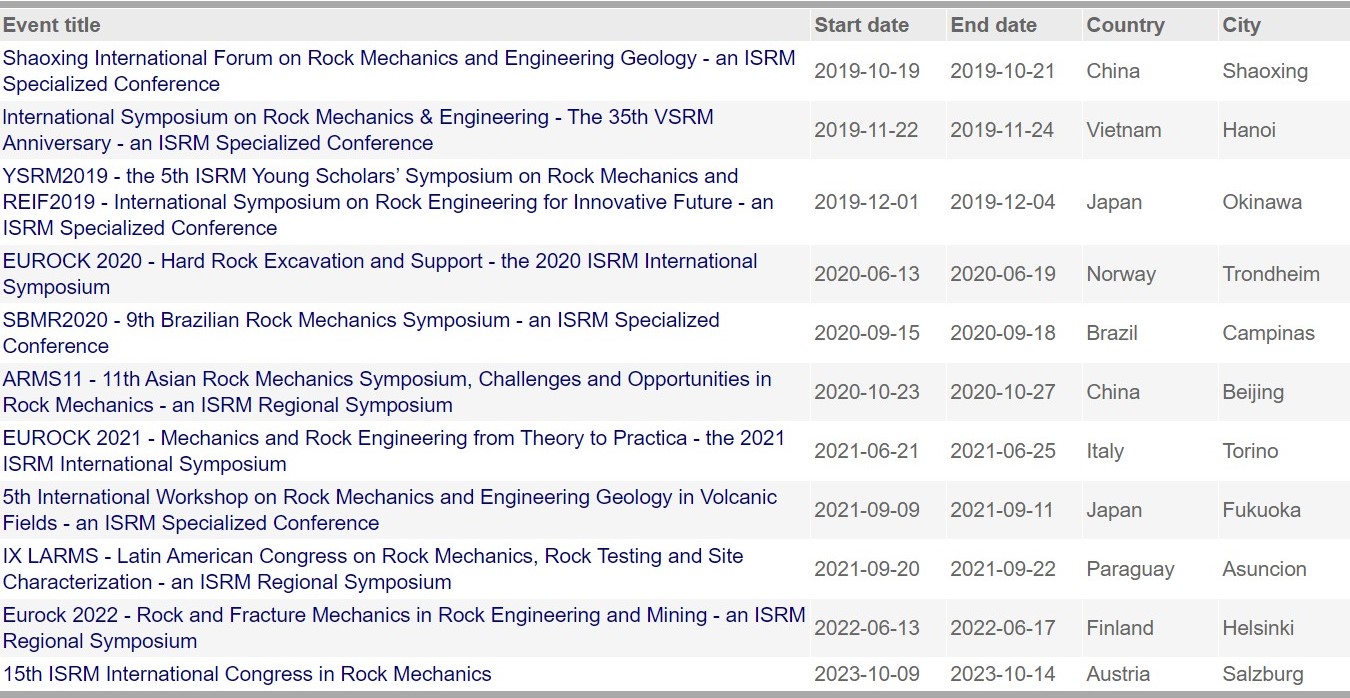
|
|
|
|
|
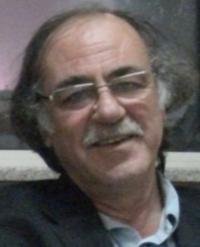 President´s inaugural message Dear Colleagues of the Rock Mechanics and Rock Engineering Community, It is a great honour for me to have been elected ISRM President for the term 2019-2023 and to take over the mission from our Immediate Past President Dr Eda Quadros. ISRM, which has been developed under the strong leadership of the Past Presidents and Board Members, has made great contributions to the discipline of Rock Mechanics and Rock Engineering. First of all, I would like to sincerely thank to Dr. Eda Quadros and immediate past ISRM Board Members and Dr Luís Lamas, ISRM Secretary General, because they left a strong and developing ISRM with an increasing number of members to the new Board. The new Board, which consists of energetic and experienced members, will try to make efforts toward further development of ISRM and to maintain the continuous progress in the modernization program of ISRM, which was initiated by Past President Prof. Merwe and followed by the last three Presidents, Profs. Hudson and Feng, and Dr. Quadros. Enhancing awareness, membership and effectiveness of the ISRM through the ISRM website, publications, ISRM Books, conferences, ISRM Online Lectures and other initiatives and giving particular encouragement and assistance to the rock mechanics communities in developing countries will be some of the main tasks of the new Board. Reactivating the ISRM Education Tours will be one of the important tools for this purpose. The new Board will do its best for providing funds for the Education Fund, which is an important Committee to support education and Young Member activities of ISRM. We acknowledged the last Board and Prof. Manchao He, the Chairman of this Committee, for their kind efforts to improve the financial facilities of this Fund. In addition to the efforts for increasing the number of ISRM National Groups, the new Board also believes that young members of a society are its future, and therefore, we should encourage more young people to become more involved in the ISRM activities. More attention to the practical aspects of rock mechanics and engineering to bring more practicing engineers to the ISRM will be another task of the new Board. The ISRM Science and Technology Award and the John Hudson Rock Engineering Award, which will be given first time by ISRM in 2020, are examples of these motivations. As a member of two ISRM Commissions since long years, I very well know that Commissions are very important bodies which contribute to technical and scientific development of ISRM. By considering this, the new Board will also pay prime attention to the activities and the performances of its Commissions, continue to encourage the development of new ISRM Suggested Methods and enhance their influence and recognition, and establish new Commissions based on new initiatives. In addition, establishment of more communication and collaboration among the ISRM Commissions and promoting the development of international guidelines for the design and construction in rock masses will be our other activities and goals. Enhancing the communication and collaboration among the ISRM members and with the sister societies such as IAEG, ISSMGE and IGS, and participation in the Board meetings of Fed-IGS will continue. When compared to the past, the use of rock mechanics in different areas has considerably increased. Therefore, ISRM should spend more effort to expand its activities in these fields and related associations, particularly promoting joint organizations of topical symposia and workshops. We believe that in the success of an international society, the support, collaboration and recommendations of its members and National Groups have vital importance and are a very important motivation for their boards. Therefore, we would be grateful to hear from you some thoughts and recommendations regarding the future of ISRM, pending issues in Rock Mechanics and Rock Engineering and submission of more news and photos on the activities realized by the ISRM National Groups to be published in the ISRM News Journal. Thank you for the opportunity to serve and wish you all of you the best and successes in the following years. Prof. Reşat Ulusay
ISRM President 2019-2023 Go to the top of the Newsletter |
|
|
|
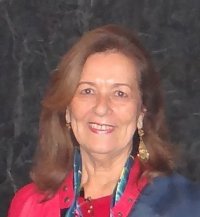 Farewell message of the ISRM President 2015-2019 Report of the ISRM President Eda F. de Quadros Presentation made to the Council meeting on 15th September 2019
in the city of Foz do Iguaçu, Brazil Good afternoon, dear ladies and gentlemen participating in this 2019 ISRM Council meeting. Welcome to all of you! Thanks for your presence here and for your efforts in bringing proxies to participate in this meeting. Our four years term of office is almost at the end! Our Board is leaving, and another Board will soon replace us, with the objective of keeping our Society running for another period of 4 years, with some new paths to be delineated and new ideas to be developed. This periodic renewal of the Board members every four years contributes to a great extent to bring to our Society fresh ideas that will join with the development achieved before, in a process that has gone on and on since 1962, the year when our Society was founded by Prof. Leopold Müller, our first President. In this last Report I would like to make a brief retrospective of some of our achievements during these four years. The main objective of our work has been to promote the world-wide awareness of rock mechanics and rock engineering, through dissemination of the latest developments and understanding of the principles that govern the scientific knowledge of rock mechanics and its applications. We made our best efforts to expand ISRM in countries and regions where the penetration of our Society did not exist or was greatly reduced within our various geographical regions. Events made in these regions with the participation of Board members, had great reward for ISRM. We succeeded in bringing 3 countries to join us as new members of ISRM. We organized more than 20 Specialized Conferences, 10 Regional Symposia and 3 International Symposia on 3 different continents. All that with the close cooperation with our National Groups. Our 14th International Congress is being held for the first time in Latin America in the border of Argentina-Brazil-Paraguay. Added to the events, we provided for our members the quarterly Newsletter during these four years, four editions of the News Journal and 17 Online Lectures given by prominent professionals from our community with the objective to disseminate and increase technical information among our members. We all realize that after some nearly 60 years of activity and continued work of ISRM, there are still many unanswered questions in the field of rock mechanics and rock engineering. Fundamentals still need to be clarified to help in the understanding of the behavior of rocks and rock masses. One of the major challenges is the varied geology, and its submission to external and internal loading provided by an excavation. Click here to continue reading. Go to the top of the Newsletter |
|
|
|
Election and inauguration of the new ISRM Board 2019-2023 The 2015-2019 ISRM Board finished its term of office at the end of the 14th ISRM International Congress on 18 September, held in Foz do Iguaçú, Brazil. The President of the 2019-2023 Board is Resat Ulusay and the Regional Vice Presidents were elected during the Council meeting that took place before the Congress. The newly elected Board appointed the following Vice Presidents at Large: Ömer Aidan (Japan), Yang Qiang (China) and Jovicic (Slovenia). Luís Lamas (Portugal) was reappointed as Secretary General. 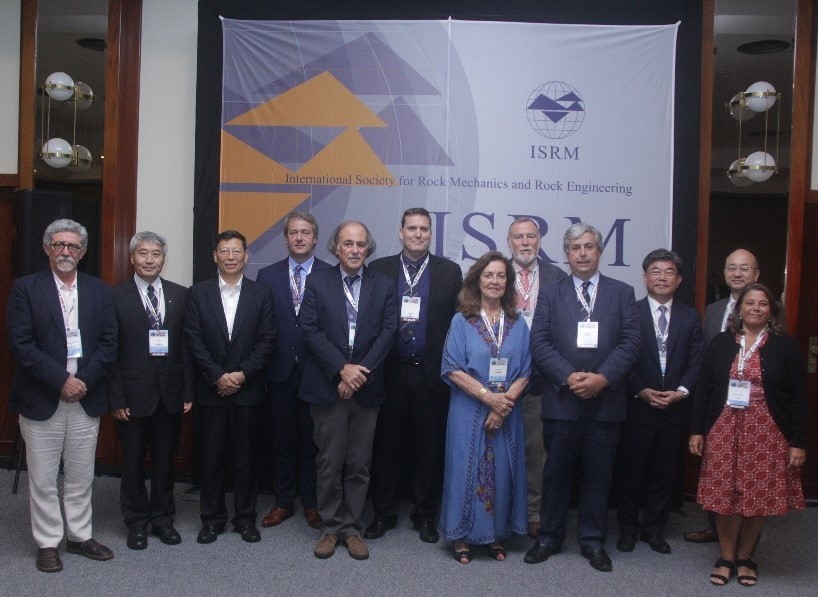 ISRM Board 2015-2019 after the Council meeting: ltr, Sérgio Fontoura, Charlie Li, Manchao He, Petr Konicek, Resat Ulusay, William Joughin, Eda Quadros, Stuart Read, Luís Lamas, Seokwon Jeon, Norikazu Shimizu and Sofia Meess (executive secretary) | 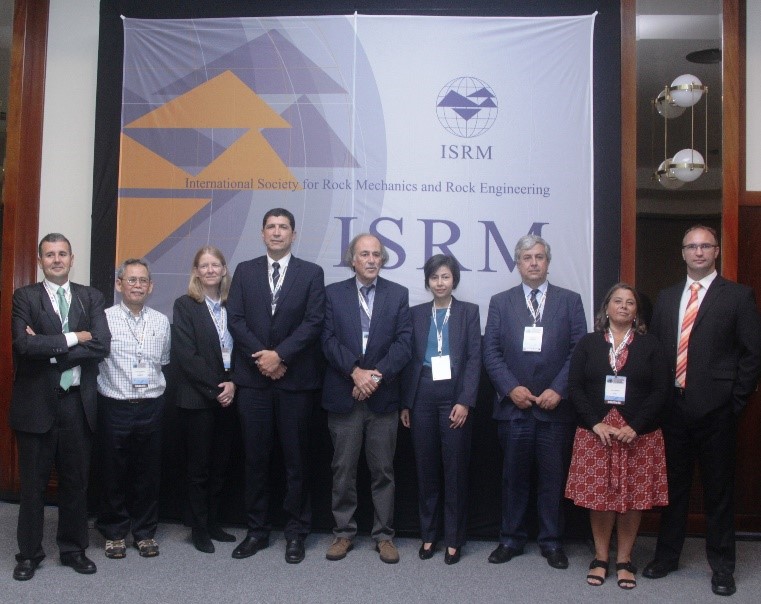 Newly elected ISRM Board 2019-2023 after the Council meeting: ltr, Leandro Alejano, Suseno Kramadibrata, Laura Pyrak Nolte, José Pavon, Resat Ulusay, Sevda Dehkhoda, Luís Lamas, Sofia Meess (executive secretary) and Michael du Plessis |
Go to the top of the Newsletter |
|
|
|
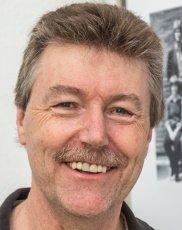 27th ISRM Online Lecture by Prof. Derek Elsworth
For the 27th ISRM Online Lecture the ISRM invited Prof. Derek Elsworth, from the Pennsylvania State University. The title of the lecture is Seismicity-Permeability Coupling in the Breaching and Sealing of Reservoirs and Caprocks. Contemporary methods of energy conversions that reduce carbon intensity include sequestering CO2, fuel switching to lower-carbon sources, such as from gas shales, and recovering deep geothermal energy via EGS. In all of these endeavors, either maintaining the low permeability and integrity of caprocks or in controlling the growth of permeability in initially very-low-permeability shales and geothermal reservoirs represent key desires. At short-timescales of relevance, permeability is driven principally by deformations – in turn resulting from changes in total stresses, fluid pressure or thermal and chemical effects. These deformations may be intrinsically stable or unstable, result in aseismic or seismic deformation, with resulting changes in permeability conditioned by the deformational mode. We report experiments and models to represent the respective roles of mineralogy, texture, scale and overpressures on the evolution of friction, stability and permeability in fractured rocks, and their consequences on fluid production, containment and induced seismicity. Derek Elsworth is a Professor in the Departments of Energy and Mineral Engineering and of Geosciences and the Center for Geomechanics, Geofluids, and Geohazards. His interests are in the areas of computational mechanics, rock mechanics, and in the mechanical and transport characteristics of fractured rocks, with application to geothermal energy, the deep geological sequestration of radioactive wastes and of CO2, unconventional hydrocarbons including coal-gas, tight-gas-shales and hydrates, and instability and eruption dynamics of volcanoes. More info on Prof. Derek Elseworth can be found athttp://www.ems.psu.edu/~elsworth/. Previous ISRM Online Lectures were given by Wulf Schubert, John Hudson, Pierre Duffaut, Eduardo Alonso, John Read, Herbert Einstein, Shunsuke Sakurai, Resat Ulusay, Dick Stacey, Jean Sulem, Nick Barton, Ove Stephansson, Peter Kaiser, Walter Wittke, Nielen van der Merwe, Giovanni Barla, Charles Fairhurst, Marc Panet, Xia-Ting Feng, Milton Kanji, Laura Pyrak-Nolte, Håkan Stille, Maurice Dusseault, Claudio Ollala, Derek Martin and José Lemos. Go to the top of the Newsletter |
|
|
|
New ISRM Fellows were inducted during the ISRM Congress 2019 Fellow is the highest and most senior grade of membership of the ISRM and is conferred on individuals, affiliated with the ISRM, who have achieved outstanding accomplishment in the field of rock mechanics and/or rock engineering and who have contributed to the professional community through the ISRM. During the 14th ISRM International Congress in Foz do Iguaçu, Brazil, six new ISRM Fellows were inducted. A group of ISRM Fellows is inducted every two years. Fellows of the ISRM form a group of experts that can provide strong support and advice to the Society, and can be called upon as appropriate for ISRM activities. They become automatically members of the ISRM Advisory Forum. 
Go to the top of the Newsletter |
|
|
|
Best Performing National Group Award 2017-2019 conferred to China and Korea The ISRM Best Performing National Group Award is conferred on an ISRM National Group in recognition of its outstanding performance and to reward a young and small National Group who is active and growing. The award is conferred by the ISRM President to up to two National Groups, on a two-yearly basis, at the quadrennial Congress of the ISRM, and at the mid-term International Symposium. The Board, at its meeting during the 14th ISRM International Congress, in Brazil, approved to give the award of best performing National Group during the period 2017-2019 to China and Korea. Go to the top of the Newsletter |
|
|
|
FedIGS – Board meeting took place in Foz do Iguaçu, Brazil The annual Board meeting of the Federation of the International Geoengineering Societies (FedIGS) took place in Foz do Iguaçu, Brazil, on 14 September, immediately before the 14th ISRM International Congress. FedIGS is a collaborative forum that gathers the IAEG, the IGS, the ISRM and the ISSMGE. FedIGS is currently is chaired by Prof. Xia-Ting Feng, immediate past President of the ISRM. The meeting was very informative and important decisions were taken. Reports of the Joint Technical Committees of FedIGS were presented, as well as reports about the activities of the four Member Societies and issues of common interest were discussed. The spirit of collaboration among all present and all the Member Societies was noteworthy. It was understood that the Federation can be very useful for the ISRM in many aspects: improvement of the relationship among the Geotechnical Societies, exchange of information on their management, technical activities and future developments. These are aspects of importance for the progress of each one the FedIGS Member Societies, and it is useful that this information is shared and discussed. FedIGS Board meetings are hosted on a rotation bases and the ISRM hosted the current meeting. A excellent dinner at the most renowned restaurant close to the Iguaçu water falls impressed the FedIGS Board Members. Go to the top of the Newsletter | 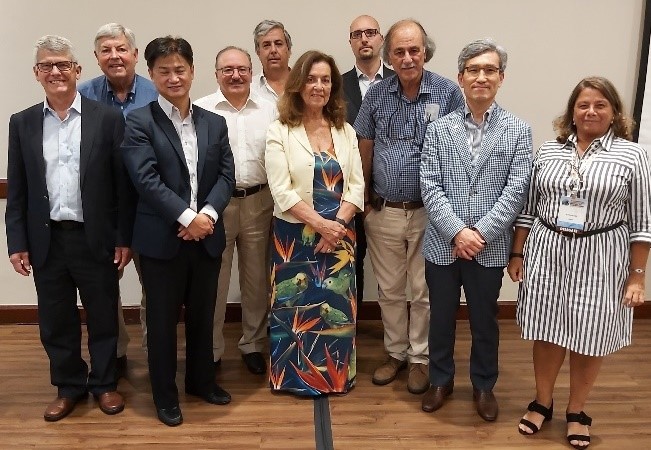
FedIGS Board 2019-2023 at Foz do Iguaçu, Brazil: ltr, Neil Taylor (ISSMGE SG), Scott Burns(IAEG past President), Charles Ng (ISSMGE President), Rafig Azzam (IAEG President), Luís Lamas (ISRM SG), Eda Quadros (ISRM President), Edoardo Zanoni (IGS SG), Resat Ulusay (ISRM President-elect), Chungsik Yoo (IGS President), Sofia Meess (ISRM executive secretary).
|
|
|
|
|
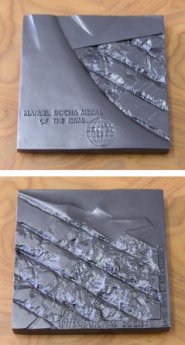 ISRM Rocha Medal 2019 - winners were selected ISRM Rocha Medal 2019 - winners were selected
The Rocha Award Committee selected the winner of the Rocha Medal 2019 and decided to award one runner-up certificate: - Winner - Shang Junlong (China) with the thesis "Persistence and tensile strength of incipient rock discontinuities" (Univ. of Leeds, UK).;
- Runner-up: Fang Yi (China) for the thesis "Induced microearthquakes and seismicity-permeability relationships in fractures" (Pennsylvania State University, USA).
The award consists of the Rocha medal, a diploma and a cash prize. It will be given during the 2020 ISRM International Symposium Eurock 2020 in Trondhein, Norway, where the winner will be invited to deliver the Rocha Lecture. Applications for the Rocha Medal 2020 shall be received at the ISRM Secretariat by 31 December 2019. Click here to go to the Rocha Medal page. Go to the top of the Newsletter |
|
|
|
Update on Eurock2020 - the 2020 ISRM International Symposium
We are pleased to announce that we after the deadline for submitting abstracts to EUROCK 2020 have received more than 400 abstracts from 41 different countries. Since EUROCK 2020 is ISRM's International Symposium, we are also very happy to see that all continents are well represented, save for Antarctica. A considerable effort has been made by our Scientific Committee and our more than 190 reviewers in reading and giving their feedback on the received abstracts – a sincere thank you to the Scientific Committee and all reviewers! The deadline for the final paper submission will be 31 October 2019, and final notice on paper acceptance 10 February 2020. The Organizing Committee are now working to put together a technical program with the right amount of parallel sessions, interesting workshops and exiting technical tours to ensure that all delegates will get as much as possible out of this conference. We are also very pleased to announce that six of the planned seven Keynotes are confirmed, giving the following Keynote line-up: - Lene Kristensen, Norway: Management and monitoring of rock avalanches in Norway
- Bjørn Nilsen, Norway: Rock engineering challenges related to deep subsea tunnels – a review based on experience from Norwegian projects
- Xia-Ting Feng, China: Intelligent monitoring and warning of rockbursts
- Kathy Kalenchuk, Canada: Support Design and Implementation in Difficult Ground Conditions - Managing the Expected and the Unexpected
- Robert Galler, Austria: New innovations for cutter disc load and face monitoring in TBM tunnelling
- Mark Zoback, USA: The importance of stress measurements for unconventional oil and gas production and preventing injection-induced seismicity
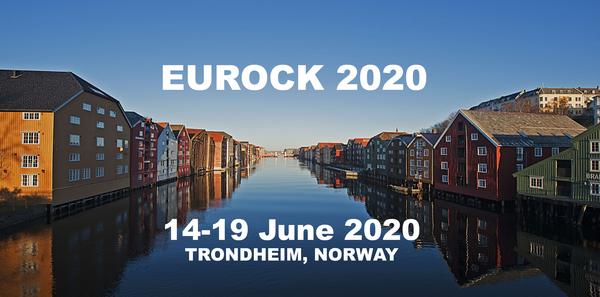 Clarion Hotel and Congress, our selected Conference venue, gives us the possibility to arrange a compact conference, meaning that the posters and the exhibitors will be located in the same large mingling area just outside the plenary rooms. We will soon finalize the floor plan and will shortly start signing contracts with sponsors and exhibitors. Please follow us at www.eurock2020.com. Henki Ødegaard Chair of EUROCK2020 Go to the top of the Newsletter |
|
|
|
International Symposium on Rock Mechanics and Engineering for Sustainable Energy, 22-24 November 2019, Hanoi, Vietnam - an ISRM Specialized Conference The International Symposium on Rock Mechanics and Engineering for Sustainable Energy - the 35th VSRM Anniversary is an ISRM Specialized Conference and the 1st Vietnam - China Researchers and Engineer Symposium. It is jointly organized by the Vietnam National Group of the ISRM - Vietnamese Society for Rock Mechanics (VSRM), the Vietnam Institute of Geological Sciences and the Chinese Society for Rock Mechanics and Engineering, and co-supported by the Korean Society for Rock Mechanics The goal of Symposium is to promote the exchange, transfer of knowledge and experience on Rock Mechanics and Rock Engineering for sustainable development of this field in Vietnam. 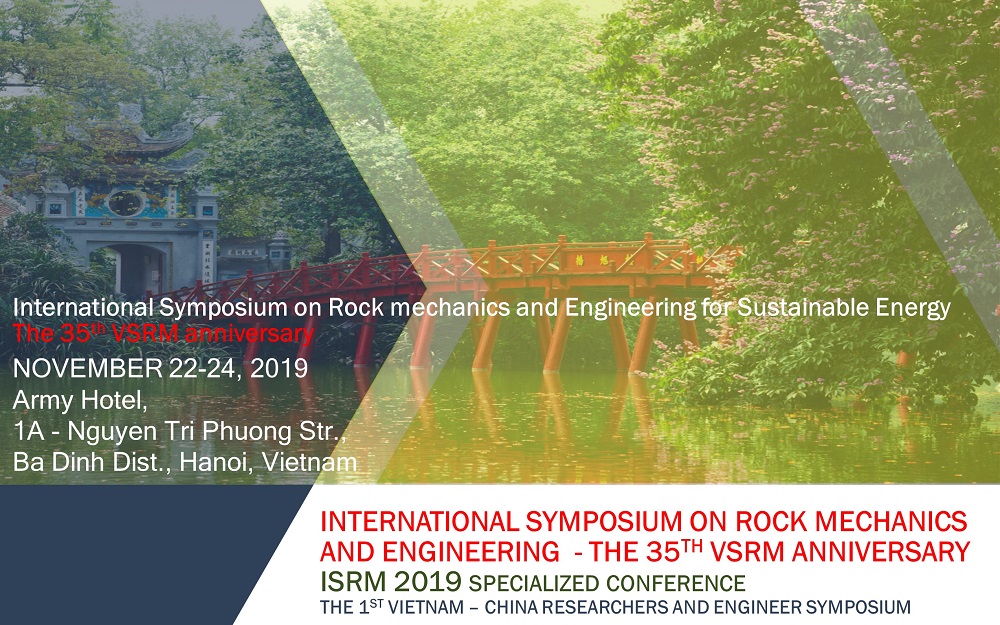
The Symposium topics are: - Rock properties and testing methods
- Tunnels and underground construction
- Slope stability
- Rock foundations
- Application of new methods of rock mechanics in mining
- Application of new methods of rock mechanics for hydropower projects, rock slopes, landslides, tunnels and shafts.
We are looking forward to see you in Hanoi and at the Symposium. Thank you for your positive response. For more information click here to visit the website. Pham Quoc Tuan
Chair Secretariat of VCRES2019 Go to the top of the Newsletter |
|
|
|
 YSRM2019&REIF2019, Okinawa, Japan, 1-4 December 2019 - ISRM Specialized Conference The Japanese Society for Rock Mechanics cordially invite you all to "YSRM 2019: The 5th ISRM Young Scholars' Symposium on Rock Mechanics & REIF 2019: International Symposium on Rock Engineering for Innovative Future". We have accepted over 230 abstracts. We are looking forward to meeting you at YSRM2019&REIF2019 in Okinawa. Topics - Innovative Technologies
- Conventional and Unconventional Energy
- Investigation and Testing, Design, Construction, Measurements and Maintenance
- Environmental Issues
- Natural Disasters and Mitigation of Geo-hazards
- Earth Sciences and Engineering Geology
Keynote Lectures selected from Young Scholars/Engineers - Ayako Kusui (Northern Star Resources Limited, Australia)
- Ki-Bok Min (Seoul National University, Korea)
- Joshua Taron (U.S. Geological Survey, USA)
- Victor Vilarrasa (Polytechnic University of Catalonia, Spain)
- Noriaki Watanabe (Tohoku University, Japan)
- Wancheng Zhu (Northeastern University, China)
For more information click here to visit the conference website. The YSRM2019&REIF2019 Organizing Committee Go to the top of the Newsletter |
|
|
|
Arctic Expedition to Svalbard organized by the Chinese Society for Rock Mechanics and Engineering 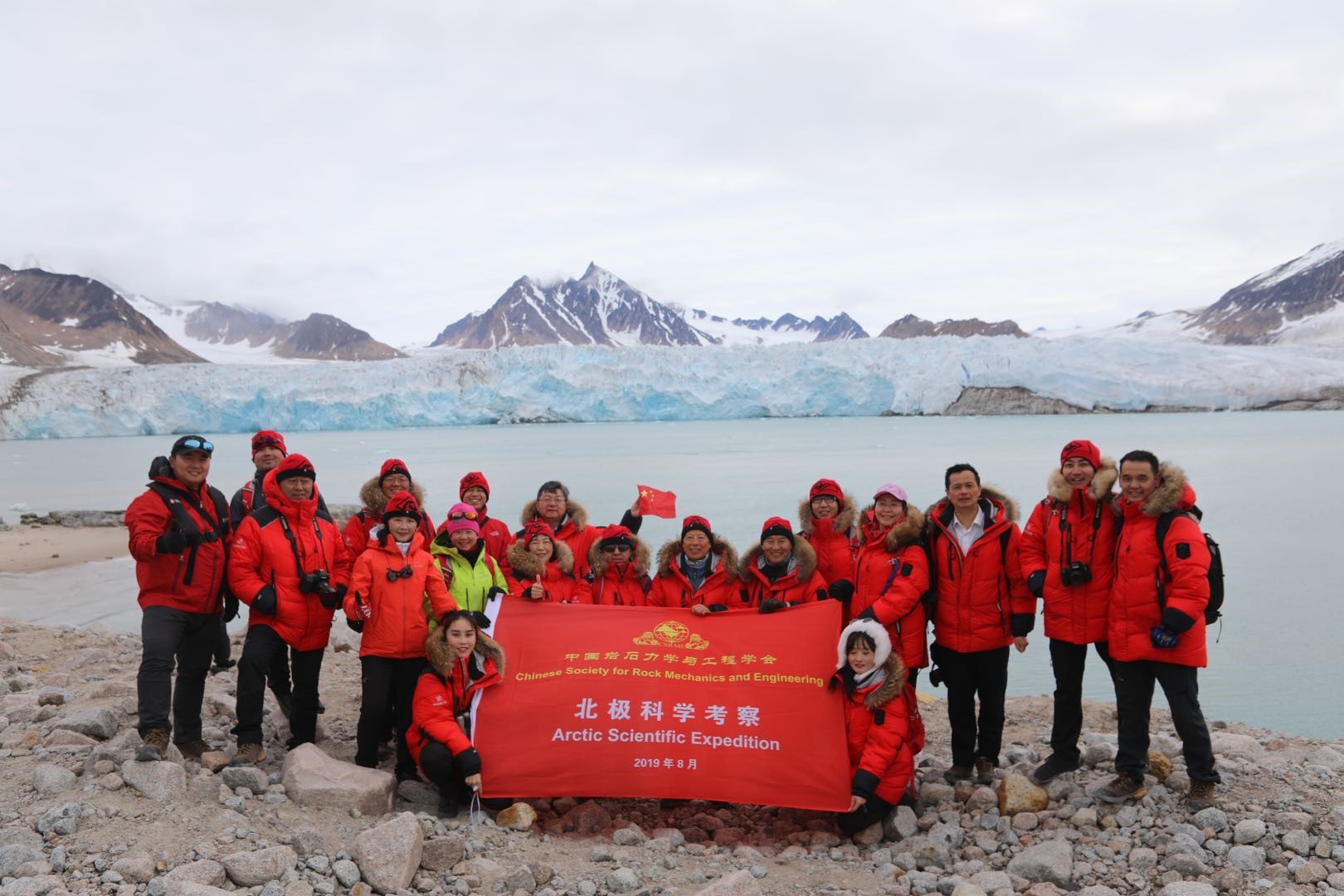 During the period of August 6-18, 2019, Chinese Society for Rock Mechanics and Engineering (CSRME) organized the first scientific expedition to Arctic region, Svalbard. Prof. Manchao He, Vice President of ISRM and President of CSRME leaded the expedition team as the chief scientist. Professor Charlie Li, ISRM VP for Europe was invited to join the expedition, as well as prof. Fawu Wang, President of ICGdR. The 19 team delegates were not only the scientist from main scientific institution of mainland, China, Norway, Japan and Hong Kong region, but also from people from media, who will make a popular film on global warming and melting of polar glaciers. During the period of August 6-18, 2019, Chinese Society for Rock Mechanics and Engineering (CSRME) organized the first scientific expedition to Arctic region, Svalbard. Prof. Manchao He, Vice President of ISRM and President of CSRME leaded the expedition team as the chief scientist. Professor Charlie Li, ISRM VP for Europe was invited to join the expedition, as well as prof. Fawu Wang, President of ICGdR. The 19 team delegates were not only the scientist from main scientific institution of mainland, China, Norway, Japan and Hong Kong region, but also from people from media, who will make a popular film on global warming and melting of polar glaciers.
The expedition was aiming to the study of polar glaciers, geology and geotechnical engineering in the Arctic. The delegation took field trips for glaciers and the metamorphic rocks along the western coastline of Spitsbergen and for the sedimentary rocks, foundations constructions in permafrost ground, underground construction (the Global Seed Vault) and the snow avalanche protection project in the Longyearbyen area. Professor Arne Aalberg arranged a seminar on 14 August at UNIS. Global warming and the melting of polar glaciers have been the unanimous concerns of the scientific community and the whole society. The melting of polar glaciers is posing critical impact on the ecosystem and climate of the earth. However, the reasons for the polar ice melting still remain uncertain. The Arctic issue is of global significance and great scientific value as it is vital to the survival and future development of the human beings. It is no doubt that CO2 contributes to the global warming, but geological evolution may play also an important role. Some scientists in the delegation are exploring the role of the earth in the global warming. In addition, glacial geology and geotechnical engineering in arctic regions are also topics of the expedition. Go to the top of the Newsletter |
|
|
|
|
|
|
|
|
|

 ISRM Rocha Medal 2019 - winners were selected
ISRM Rocha Medal 2019 - winners were selected























